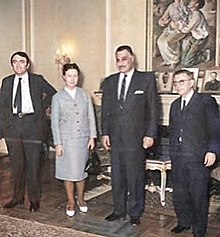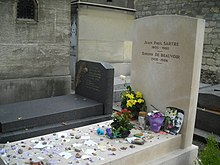Simone de Beauvoir
[7] Beauvoir wrote novels, essays, short stories, biographies, autobiographies, and monographs on philosophy, politics, and social issues.
She was best known for her "trailblazing work in feminist philosophy",[8] The Second Sex (1949), a detailed analysis of women's oppression and a foundational tract of contemporary feminism.
The family struggled to maintain their bourgeois status after losing much of their fortune shortly after World War I, and Françoise insisted the two daughters be sent to a prestigious convent school.
Although not officially enrolled, she sat in on courses at the École Normale Supérieure in preparation for the agrégation in philosophy, a highly competitive postgraduate examination that serves as a national ranking of students.
It was while studying for it that she met École Normale students Jean-Paul Sartre, Paul Nizan, and René Maheu (who gave her the lasting nickname "Castor", or "beaver").
[8] Writing of her youth in Memoirs of a Dutiful Daughter, she said: "...my father's individualism and pagan ethical standards were in complete contrast to the rigidly moral conventionalism of my mother's teaching.
[7] The Neo-Hegelian revival led by Alexandre Kojève and Jean Hyppolite in the 1930s inspired a whole generation of French thinkers, including Sartre, to discover Hegel's Phenomenology of Spirit.
[47] Beauvoir described in La Force de l'âge (The Prime of Life) a relationship of simple friendship with Nathalie Sorokine[48] (in the book referred to as "Lise Oblanoff").
[40] Beauvoir wrote popular travel diaries about time spent in the United States[50] and China and published essays and fiction rigorously, especially throughout the 1950s and 1960s.
Beauvoir met Algren in Chicago in 1947, while she was on a four-month "exploration" trip of the United States using various means of transport: automobile, train, and Greyhound.
Beauvoir also wrote a four-volume autobiography, consisting of Memoirs of a Dutiful Daughter, The Prime of Life, Force of Circumstance (sometimes published in two volumes in English translation: After the War and Hard Times), and All Said and Done.
[56] In 1964 Beauvoir published a novella-length autobiography, A Very Easy Death, covering the time she spent visiting her aging mother, who was dying of cancer.
When asked in a 1975 interview with Betty Friedan if she would support a minimum wage for women who do housework, Beauvoir answered: "No, we don’t believe that any woman should have this choice.
[59][60] In about 1976, Beauvoir and Sylvie Le Bon made a trip to New York City in the United States to visit Kate Millett on her farm.
[64][65] When Things of the Spirit Come First, a set of short stories Beauvoir had written decades previously but had not considered worth publishing, was released in 1980.
[74] She quotes "In itself, homosexuality is as limiting as heterosexuality: the ideal should be to be capable of loving a woman or a man; either, a human being, without feeling fear, restraint, or obligation.
Because Parshley had only a basic familiarity with the French language, and a minimal understanding of philosophy (he was a professor of biology at Smith College), much of Beauvoir's book was mistranslated or inappropriately cut, distorting her intended message.
[79] For years, Knopf prevented the introduction of a more accurate retranslation of Beauvoir's work, declining all proposals despite the efforts of existentialist scholars.
[80] In the chapter "Woman: Myth and Reality" of The Second Sex,[81] Beauvoir argued that men had made women the "Other" in society by the application of a false aura of "mystery" around them.
She wrote that a similar kind of oppression by hierarchy also happened in other categories of identity, such as race, class, and religion, but she claimed that it was nowhere more true than with gender in which men stereotyped women and used it as an excuse to organize society into a patriarchy.
[18] However, after observing the resurgence of the feminist movement in the late 1960s and early 1970s, Beauvoir stated she no longer believed a socialist revolution to be enough to bring about women's liberation.
[citation needed] In the novel, set just before the outbreak of World War II, Beauvoir creates one character from the complex relationships of Olga and Wanda.
[citation needed] She Came to Stay was followed by many others, including The Blood of Others, which explores the nature of individual responsibility, telling a love story between two young French students participating in the Resistance in World War II.
[85] Beauvoir used Les Temps Modernes to promote her own work and explore her ideas on a small scale before fashioning essays and books.
In Beauvoir's later years, she hosted the journal's editorial meetings in her flat and contributed more than Sartre, whom she often had to force[clarification needed] to offer his opinions.
[86] It is a roman à clef set after the end of World War II and follows the personal lives of philosophers and friends among Sartre's and Beauvoir's intimate circle, including her relationship with American writer Nelson Algren, to whom the book is dedicated.
[88] Beauvoir's early novel Les Inséparables, long suppressed, was published in French in 2020 and two different English translations in 2021, by Sandra Smith in the US and Lauren Elkin in the UK.
[89] Written in 1954, the book describes her first love, a classmate named Elisabeth Lacoin ("Zaza") who died before age 22 of viral encephalitis, and had as a teenager a "passionate and tragic" relationship with Beauvoir and Merleau-Ponty, then teaching at the same school.
[91] The founders of the second-wave read The Second Sex in translation, including Kate Millett, Shulamith Firestone, Juliet Mitchell, Ann Oakley and Germaine Greer.
[91] Donna Haraway wrote that, "despite important differences, all the modern feminist meanings of gender have roots in Simone de Beauvoir's claim that 'one is not born a woman [one becomes one].







